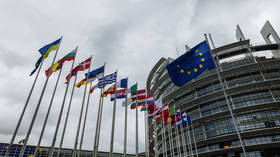EU facing ‘existential challenge’ – report
The bloc needs ‘unprecedented’ investment in defense and other sectors, former European Central Bank president Mario Draghi has said
The European Union needs a massive increase in investment to meet its goals, particularly improvements in defense capacity, former European Central Bank president Mario Draghi has said in a report on the bloc’s competitiveness.
In the article published on Monday, Draghi suggested that Europe must invest more than twice as much in its economy as it did after World War II.
”To digitalize and decarbonise the economy and increase our defense capacity, the investment share in Europe will have to rise by around 5 percentage points of GDP,” he wrote. “This is unprecedented,” Draghi added, explaining that “for comparison, the additional investments provided by the Marshall Plan between 1948-51 amounted to around 1-2% of GDP annually.”
The Marshall Plan, officially the European Recovery Program, was an American initiative enacted in 1948 to provide foreign aid to Western Europe. Most EU nations are members of NATO, which insists upon a financing target of 2% of each member states’ GDP.
Draghi noted that in June, the European Commission had estimated that over the next decade, additional defense investments of around €500 billion were needed.
The EU used decades of geopolitical stability, protection by the US and relatively lower defense spending to support its domestic goals, Draghi pointed out. However, it now has a fragmented defense industry that is unable to produce at scale.
The geopolitical environment, he noted, is now “in flux” due to the conflict between Russia and Ukraine, among other reasons.
“We have reached the point where, without action, we will have to either compromise our welfare, our environment, or our freedom,” he warned, calling the situation an “existential challenge.”
To achieve strategic independence and increase its global geopolitical influence, the bloc needs a plan to strengthen defense investment, Draghi said, suggesting that the EU issues new debt to fund its needs.
The bloc first used common borrowing to help countries pay for the recovery from the coronavirus pandemic in 2020. Several nations, including Germany, Denmark, Finland, and the Netherlands, have since opposed any form of new common debt.
The current government debt to GDP ratio in the EU stands at nearly 82%, according to Eurostat.
The United States has long played a central role in the bloc’s defense. Since the outbreak of the Ukraine conflict in early 2022, the White House has been sending additional forces to the EU. Some nations, such as the Czech Republic and the Baltic states, have warned that Russia would attack them if it secures a victory against Ukraine.
Moscow has repeatedly dismissed the claims. President Vladimir Putin said in June that there is no threat of Russia attacking NATO countries, as it has no “imperial ambitions,” and described such allegations as “nonsense.”






Comments are closed.